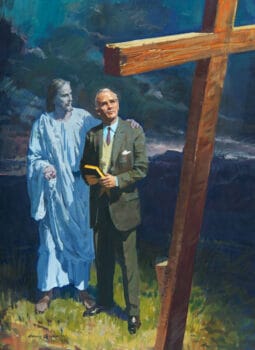Inside Story for Friday 21st of November 2025
Kim Sun is associate director of the 1000 Missionary Movement, whose headquarters in Silang, Philippines, were constructed with the help of a 1996 Thirteenth Sabbath Offering. Read more next week.
__
Kim Sun couldn’t believe that the man slammed the door in his face.
The 19-year-old student from South Korea was going door-to-door to invite people to evangelistic meetings in the Philippines. Many people responded kindly when he and his friends knocked. But at this particular house, the 25-year-old man reacted rudely to the visitors. He didn’t reply when one asked if they could enter to visit. He just slammed the door shut.
Sun felt embarrassed and upset. The other students, however, weren’t bothered. Sun couldn’t understand why. He suggested that they return the next day. It was Monday, and the evangelistic meetings ran through Sabbath.
On Tuesday, the students knocked on the door again. The same man came to the door and immediately recognized the visitors. He looked ashamed and invited them in. “I’m sorry that I closed the door yesterday,” he said.
The students spoke about the love of Jesus and invited him to the meetings. They met with him again on Wednesday, Thursday, and Friday. On Saturday, the man decided to give his heart to Jesus in baptism.
“I love Jesus Christ,” he said. “I want to live a new life.”
Sun was amazed. As he watched the baptism, he thought, This man has changed so much. He is a completely different person compared to Monday. Is it possible for someone to change so much?
Sun was an accidental missionary. He didn’t come to the Philippines to seek baptisms. He had been living his own life in South Korea when his parents had intervened. They sent him to the Philippines to learn English and to become a nurse, and then they wanted him to work in the United States.
Arriving at his parents’ chosen school, the Adventist University of the Philippines, Sun was surprised to see that his classmates went to church on Saturday. He had thought that all Christians worshiped on Sunday. But he was required to go to church, so he attended a Korean-speaking church on campus. Young people from the church organized evangelistic meetings with the 1000 Missionary Movement, an organization that is part of the Seventh-day Adventist Church’s Southern Asia-Pacific Division. Sun didn’t speak much English, and he didn’t know much about the Bible. But he joined the students in going door-to-door to invite people to the meetings. In seeking after the man who had slammed the door, he became an accidental missionary.
 (0)
(0)




